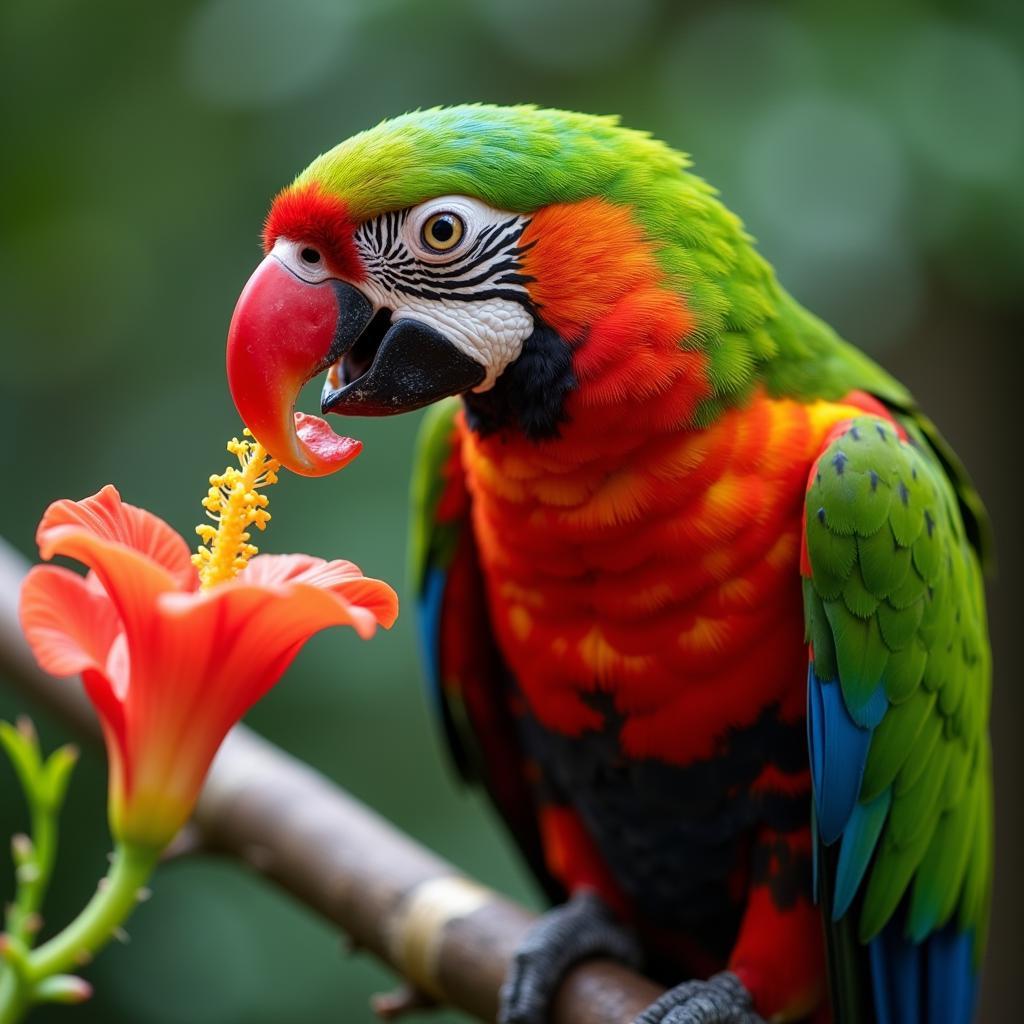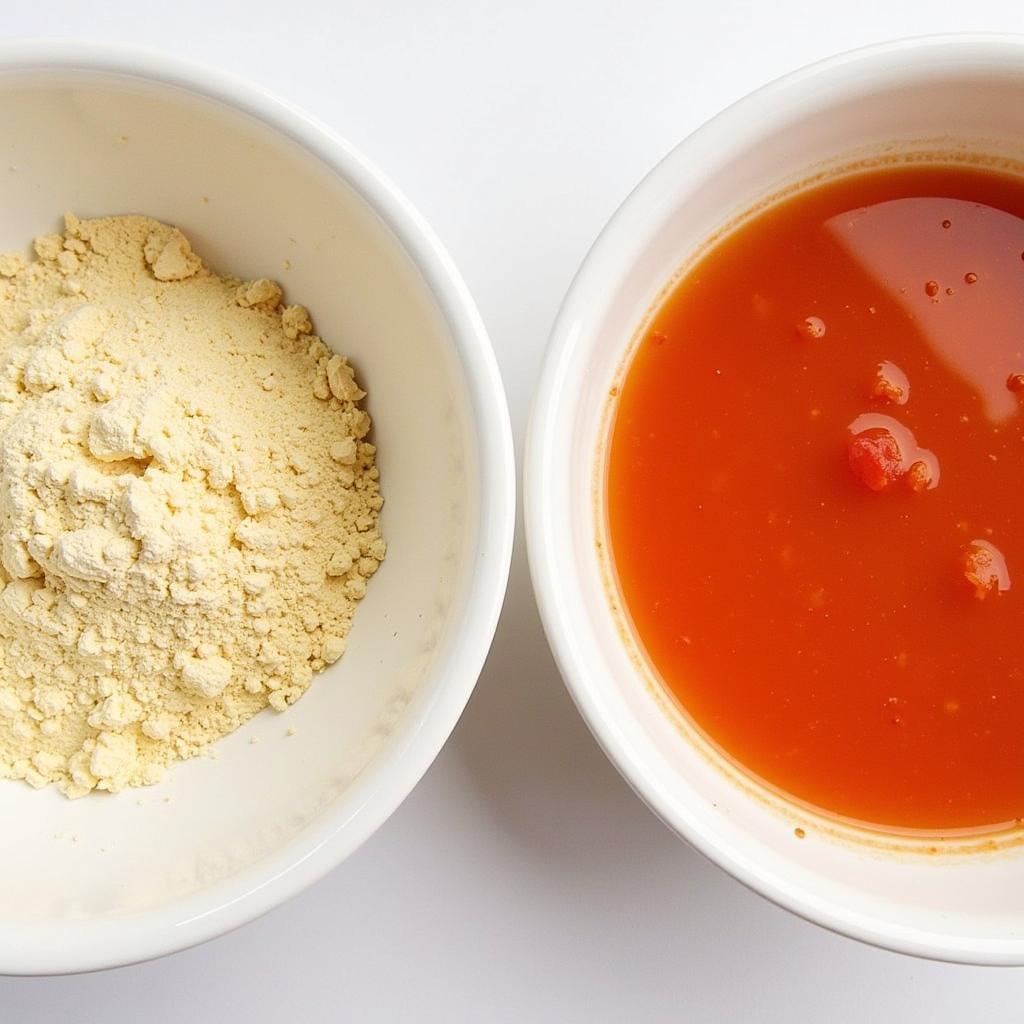Lory Parrot Food is a critical aspect of keeping these vibrant birds healthy and happy. Proper nutrition is essential for maintaining their bright plumage, energetic personalities, and long lifespans. This guide dives deep into the specifics of lory parrot food, covering everything from their unique dietary needs to creating balanced meals and choosing commercial options.
Understanding the Unique Dietary Needs of Lory Parrots
Unlike other parrot species, lories have specialized digestive systems adapted for a nectar-based diet in the wild. Their tongues are equipped with brush-like papillae designed to collect nectar and pollen. This means their nutritional requirements differ significantly from seed-eating parrots. They require a higher intake of carbohydrates and sugars but also need essential proteins, vitamins, and minerals to thrive.
Why Nectar is Important
Nectar provides lories with the quick energy they need for their active lifestyles. It’s important to replicate this in captivity with specially formulated lory nectars. These nectars are designed to mimic the natural sugars and nutrients found in wild nectar sources.
Beyond Nectar: The Importance of Supplementary Foods
While nectar forms the base of a lory’s diet, it doesn’t provide all the nutrients they need. Supplementary foods like fruits, vegetables, and specially formulated lory pellets are crucial for providing a balanced nutritional intake. These additions ensure lories receive essential vitamins, minerals, and proteins not found in nectar alone.
 A lory parrot enjoying its nectar meal
A lory parrot enjoying its nectar meal
Choosing the Right Commercial Lory Parrot Food
With numerous commercial lory foods available, it’s essential to choose high-quality options that meet your bird’s nutritional needs. Look for nectars and pellets specifically formulated for lories, ensuring they contain a balanced blend of carbohydrates, proteins, vitamins, and minerals.
Reading Labels and Understanding Ingredients
Always check the ingredient list. Avoid products containing artificial colors, flavors, or preservatives. Opt for natural ingredients and a balanced nutritional profile. The guaranteed analysis should clearly state the percentages of crude protein, fat, fiber, and moisture.
Dry vs. Wet Nectar: Making the Right Choice
Both dry and wet nectar options are available. Dry nectar offers convenience and longer shelf life, while wet nectar is often more appealing to lories. Consider your bird’s preferences and lifestyle when making your choice. Some lories may prefer the texture and taste of wet nectar, while others may find dry nectar equally satisfying.
 A side-by-side comparison of dry and wet lory nectar
A side-by-side comparison of dry and wet lory nectar
Creating Balanced Meals for Your Lory Parrot
Providing a variety of foods is key to a healthy lory diet. Combine commercial nectar and pellets with fresh fruits and vegetables to offer a diverse and nutritionally rich diet.
Incorporating Fruits and Vegetables
Offer a colorful mix of fruits and vegetables like papaya, mango, berries, apples, kale, and spinach. These provide essential vitamins, minerals, and antioxidants.
What to Avoid Feeding Your Lory Parrot
Certain foods are toxic to lories and should be avoided entirely. Avocado, chocolate, caffeine, and alcohol are all harmful and can lead to severe health problems.
How Much Should You Feed Your Lory Parrot?
The amount of food a lory needs depends on its size, activity level, and individual metabolism. Consult with an avian veterinarian for personalized feeding recommendations.
Conclusion
Providing the proper lory parrot food is essential for their overall health and well-being. By understanding their unique dietary needs and offering a balanced and varied diet, you can ensure your lory thrives. Remember to choose high-quality commercial foods and supplement them with fresh fruits and vegetables. By following these guidelines, you can help your lory live a long, healthy, and vibrant life.
FAQ
- What is the best type of nectar for lories?
- Can lories eat seeds?
- How often should I change my lory’s nectar?
- What are the signs of a nutritional deficiency in lories?
- Can I make my own lory nectar?
- What fruits and vegetables are safe for lories?
- How can I encourage my lory to try new foods?
Need more support? Contact us at Phone Number: 02437655121, Email: minacones@gmail.com Or visit us at: 3PGH+8R9, ĐT70A, thôn Trung, Bắc Từ Liêm, Hà Nội, Việt Nam. We have a 24/7 customer service team.